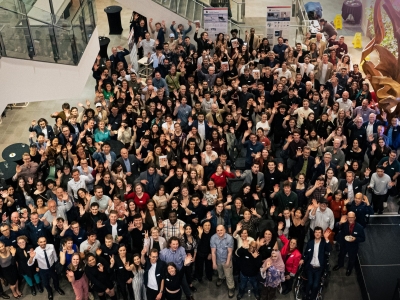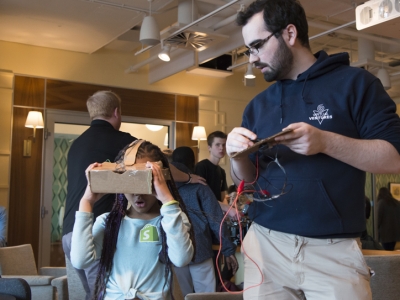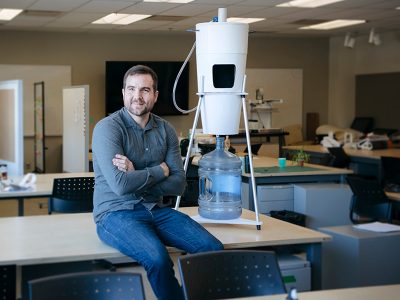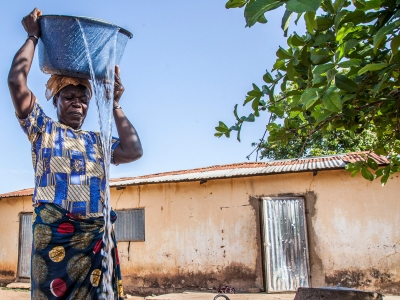By Leah Coppella
In celebration of International Women’s Day and International Womxn’s Week in Ottawa, Carleton University’s Faculty of Engineering and Design hosted its third annual Breakthrough Breakfast on March 4, 2021.
At 9:00am, Carleton alumni, faculty, staff, industry and the wider Ottawa community gathered online to kickstart their morning with a healthy dose of inspiration, eager to hear from three innovative women researchers at Carleton.
Taking place in partnership with International Womxn’s Week in the Nation’s Capital – spearheaded by Invest Ottawa, the virtual event was hosted by Dr. Audrey Girouard, professor in the School of Information Technology and head of both the Collaborative Learning of Usability Experiences training program and Creative Interactions Lab at Carleton.
Despite the switch from in-person to online, attendees were able to interact with speakers, engaging with live polls and a Q+A session.
The first of three speakers, Brittany Allison, a Master of Applied Science candidate in Computer and Electrical Engineering, introduced her research on internet speeds and data centers by leading attendees through “the story behind an internet search”.
Allison explained how data traffic is continuing to increase due to the rapid development of cloud communication, 5G networking, media sharing and increased work from home due to COVID-19.
Because of this traffic growth, we are met with higher bandwidth requirements on communication networks, calling for ways to improve internet access and speed. To accomplish this, Allison is looking to implement next-generation high-speed electronics for data centre applications, improving techniques in order to create quicker systems.
Since she was a child, Allison has known she wanted to be an engineer – recalling her excitement as a little girl to help assemble furniture or build card castles. Her biggest influence and mentor was her Aunt Theresa, who graduated from Carleton’s Mechanical Engineering program in 1996.
“As a child, I would often wear her Iron Ring and call myself an engineer or put her ring somewhere interesting for a good laugh,” Allison says.
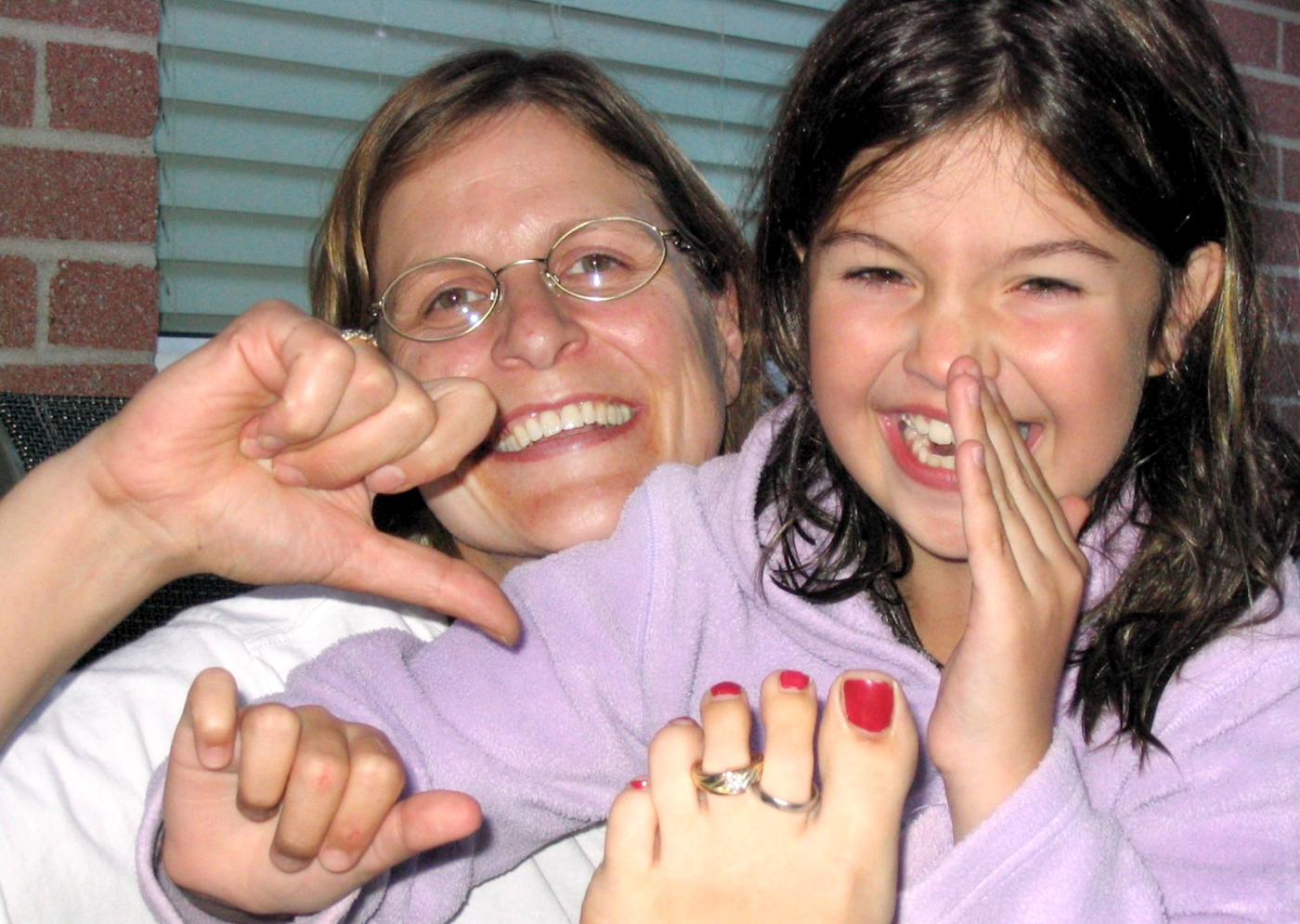
Brittany Allison (right) having fun with her Aunt Theresa’s Iron Ring in 2004.
While conducting her research, Allison was surprised to discover how often we take technology for granted.
“Until I started looking at how communication networks work, I had no idea how much innovation, effort and complex systems are put into something as simple as an internet search.”
Fortunately, Allison is optimistic about the future of high-speed tech.
“With technology advancing as quickly as it is, there is no shortage of innovation space in high-speed electronics,” Allison says. “Today’s trivial systems could inspire tomorrow’s innovation.”
In 2019, Allison’s Aunt Theresa was able to present her with her own Iron Ring.
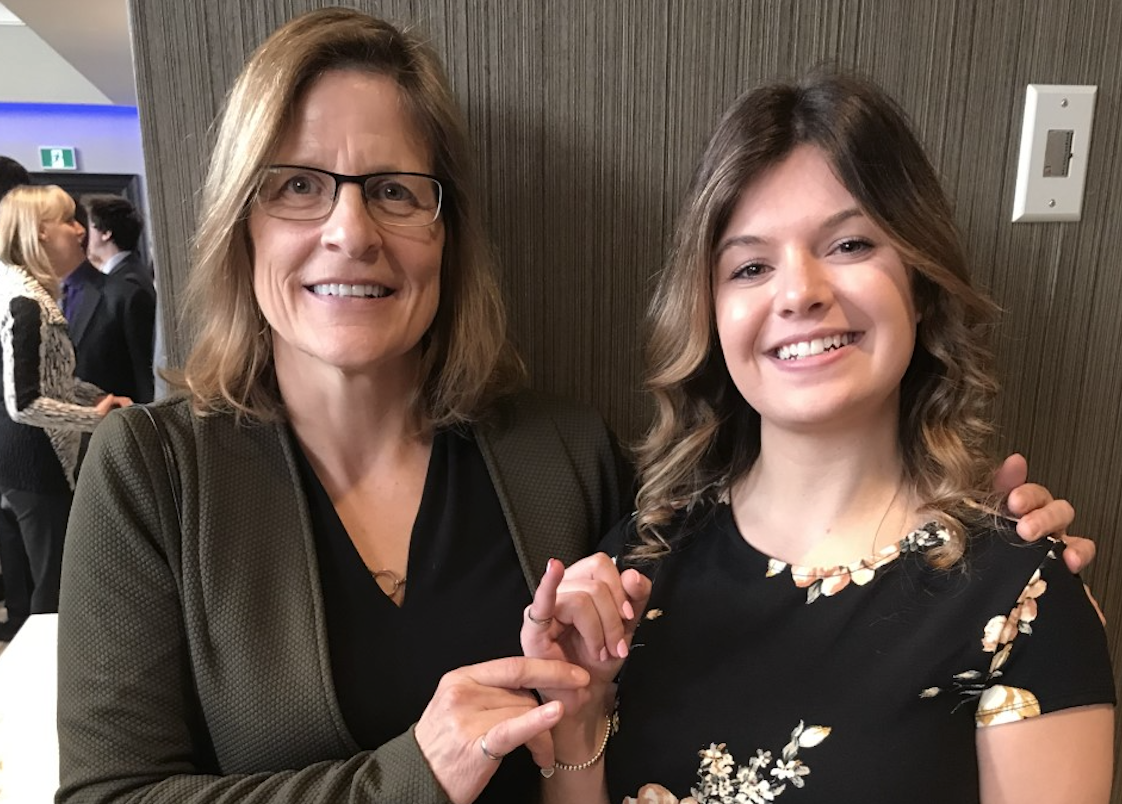
Brittany Allison (right) and her Aunt Theresa wearing their Iron Rings.
“Needless to say, I am very proud to be a woman in engineering, influenced by women who came before me and hopefully encouraging those who come after.”
Emma Farago, a PhD candidate in Electrical Engineering, spoke about her research on ‘Building Better Robots’, through the development of wearable smart assistive and rehabilitative devices and tech. Working with supervisor Dr. Adrian Chan of the Department of Systems and Computer Engineering, her PhD thesis focuses specifically on muscle signals as a way to control and improve smart assistive and rehabilitative devices.
“I was surprised when I realized poor signal quality is one of the major limitations to the widespread use of wearable technology such as prosthetics and exoskeletons,” Farago says.
Her work, therefore, combines creativity and perseverance in researching how to accurately process muscle signals to ensure they are of good quality before they are used to control a device. Farago had attendees at-home demonstrate movement of the muscles in their hand, in order to show how an electrode band might measure the activity of a specific muscle.
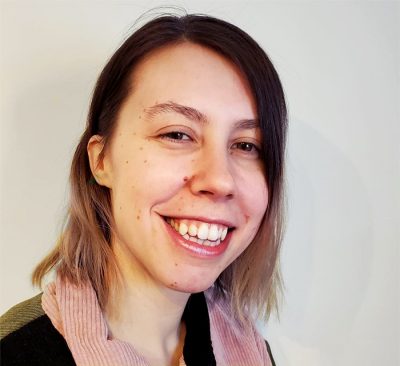
Emma Farago
“What I love about research, is how it allows humanity to expand our knowledge about the world. I’ve always wanted to do research for this reason: I love learning new things and being creative. I want to continue to innovate and discover new ideas.”
For Farago, International Womxn’s Week is more than a week to celebrate how far women have come, but also a time to reflect on the women who have made their STEM journeys worthwhile.
“STEM fields are often stereotyped as cold and uncaring, but that has been far from my experience,” Farago says. “I have met so many truly wonderful people through my studies in engineering. My Master’s supervisor Dr. Ana Luisa Trejos is an incredible researcher who I have learned so much from. All of her students, both male and female, look up to her as a role model.”
The morning’s final speaker, Dr. Jin Kang, a Postdoctoral Fellow at Girouard’s Creative Interactions Lab, is currently interested in how to design communication technologies and media to promote individuals’ wellbeing. At the event, she focused on her projects on chatbot, social media, and wearable trackers, asking questions like: Should a chat bot be emotionally intelligent? Should a video game avatar look like the player’s ideal self? And what makes fitness reminders persuasive?
“We are surrounded by these technologies every day and I want to understand how these technologies particular features can be designed to help someone become the best version of themselves.”
For Kang, International Womxn’s Week and events that support women in STEM mean a lot to her academic journey.
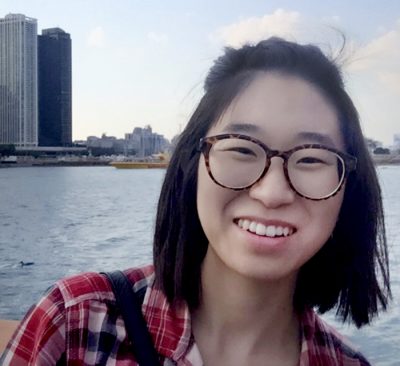
Dr. Jin Kang
“Events like this are important to me because I had a female undergraduate mentor who helped me see that graduate school is also for students like me: a female, an immigrant, a Korean-Canadian, shy,” Kang says. “So I hope that my involvement in these events can help someone who is like me to see their potential too in pursuing research.”
Kang says she has been supported by many women mentors during her research, including her my undergraduate mentor, Dr. Joni Sasaki, and current postdoc advisor, Dr. Audrey Girouard.
“Both of them have shown me what it feels like to be cared for and supported in your research and during your professional and personal growth.”
While attendees were treated to an in-depth look at the innovative worlds of these three graduate-level women researchers, they were also given a sneak-peek at the future of women in STEM, a future that is not only ground-breaking, but just beginning.
Friday, March 12, 2021 in Computer Systems, Electrical, Events, Graduate, Information Technology, Research, Women in Engineering
Share: Twitter, Facebook
